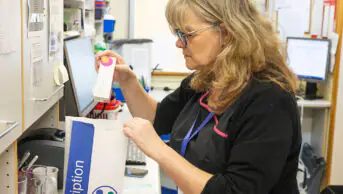
Shutterstock.com
Community pharmacies could directly identify and manage chronic conditions, such as asthma and diabetes, as part of “a much more clinically focused role”, two leading think tanks have concluded.
A broader range of clinical services that will be nationally specified and priced, and available consistently in all locations, will be vital to the development of the sector, the Nuffield Trust and King’s Fund said in their joint report ‘A vision for community pharmacy’, published on 19 September 2023, which was commissioned by Community Pharmacy England.
“Pharmacies will be able to opt to do more than this, in agreement with their local commissioners, drawing from a nationally-agreed menu of additional services and to develop and agree other additional services to meet local needs,” the report adds.
The vision includes two tables listing services that could be available from pharmacies in five years’ time, and a further set of services available in five to ten years’ time.
The report says that this will build on the current community pharmacy contract, with some services that are currently defined as ‘advanced’ becoming ‘essential’ over the next five years, and new services added to the ‘enhanced’ suite of services.
“Our expectation is that this progression will continue in future years, with the menu of services kept under review so that as those services currently described as ‘advanced’ become the norm, they will move into the ‘essential’ category and be replaced by services which might currently be regarded as new and innovative and funded as ‘enhanced’ services,” the report says.
“In turn, we expect that new enhanced services will be identified through local piloting and testing and agreed for future inclusion.”
It foresees the most widely available, essential services in five years’ time, including all those services currently in the community pharmacy contract, plus others, including a walk-in version of the community pharmacist consultation service; a new medicine service; and deprescribing and amendment of prescriptions.
In five to ten years’ time, the vision sees nationally-agreed and priced advanced services available, including vaccinations beyond flu and COVID-19, and national enhanced services, including annual asthma reviews and management of minor injuries.
However, for this “significant transformation” to be realised, the report says several barriers need to be tackled, including freeing up pharmacist capacity, a significant increase in funding, investment in IT, access to patient records, overcoming mistrust between primary care professionals and low public expectations.
The vision also says that legislative changes would be needed to allow for dispensing without a pharmacist on site if pharmacists are to be freed up to take on more clinical care.
In August 2023, a cross-sector group of pharmacy bodies published a report stating that supervision in community pharmacy “should no longer be interpreted to mean [a pharmacist] supervising individual transactions”.
The report from the Supervision Practice Group said that supervision should instead mean that a pharmacist is present in the pharmacy and accessible to patients, and recommended that public, primary and secondary legislation should be “clarified” and “updated” to reflect this.
Helen Buckingham, director of strategy at the Nuffield Trust, and one of the co-authors of the vision, said the think tanks had purposely focused on what enablers were needed to ensure the vision could happen.
“We are really clear that if this vision is going to be delivered, it will because there has been a focus on the workforce, there’s been a focus on IT infrastructure and making sure that pharmacy is considered as part of estate planning,” she said.
“We’re really emphasising that we’re expecting NHS England and independent care boards to be thinking about pharmacy as central to their primary care strategy and not an add-on. As much as anything, it’s a mindset.”
Richard Murray, chief executive of the King’s Fund, who also co-authored the report, said the vision would need “determination and commitment” not only from the NHS but also the community pharmacy sector itself.
“If community pharmacy steps up to seize these new opportunities then there will be benefits to their business and, critically, they can provide better and more convenient access to health services for patients and the public,” he said.
Commenting on the report, Tase Oputu, chair of the Royal Pharmaceutical Society’s English Pharmacy Board, said: “Throughout our work with The King’s Fund last year, we consistently heard from health and care leaders how community pharmacy has a fundamental part to play in the health service of the future.
“Today’s report is a welcome addition to this conversation and sets out a roadmap for the government and the NHS to help maximise community pharmacy’s role to support patient care.
“There are some key enablers to make this a success, including workforce planning to ensure a pipeline of pharmacists for the future, making best use of skill mix within pharmacy teams, and much-needed investment in IT and interoperable patient records.”
Janet Morrison, chief executive of Community Pharmacy England, said the body supported the direction of travel set out in the report, which describes what needs to happen to “help pharmacies thrive”.


